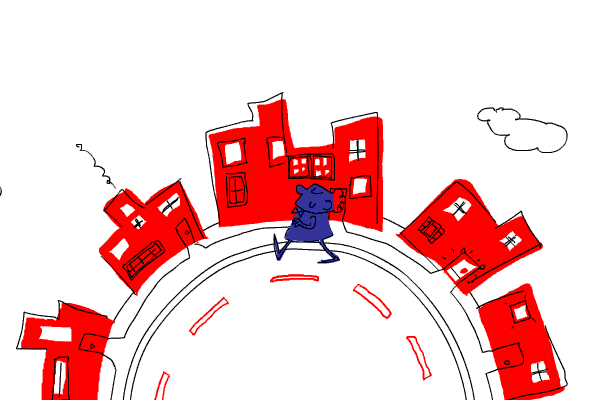The Future of Games is Remote
Remote Work will be a constant in near future, and the Game Industry needs it! Read it to get more of what we at HireGamePros believe in.

There’s no denying it. Whether you reluctantly accept or passionately embrace it, it IS happening!
We’ve been seeing signs for quite a few years now. Remote work has generally been on the rise for the past half a decade (with 37% of US employees reporting having done some of their work remotely in 2015). One witnesses the cultural undercurrent of this phenomenon on social networks where ‘remote’ lifestyle is increasingly visible.
 And new companies which are springing up to meet the growing and unmet need of being able to efficiently and effectively work remotely and enjoy all the benefits that come along with that. From housing/co-living solutions to logistics (Roam, Outsite, Remote Year, Nomad House, Uber), from self management and productivity tools to collaboration softwares ( Saent, Slack,Zoom, Trello), we see a revolution that is slowly but surely underway. This ‘going remote’ revolution is fueled by the belief that talent should not be constrained by geographic location, that great talent can be found anywhere and that we’re finally at a technological stage to benefit from this meritocracy at its purest. I’d go as far as to say that individuals and companies that don’t embrace this, will lose out in the long run. 37signals puts it quite aptly in their book ‘Remote, Office not required’:
And new companies which are springing up to meet the growing and unmet need of being able to efficiently and effectively work remotely and enjoy all the benefits that come along with that. From housing/co-living solutions to logistics (Roam, Outsite, Remote Year, Nomad House, Uber), from self management and productivity tools to collaboration softwares ( Saent, Slack,Zoom, Trello), we see a revolution that is slowly but surely underway. This ‘going remote’ revolution is fueled by the belief that talent should not be constrained by geographic location, that great talent can be found anywhere and that we’re finally at a technological stage to benefit from this meritocracy at its purest. I’d go as far as to say that individuals and companies that don’t embrace this, will lose out in the long run. 37signals puts it quite aptly in their book ‘Remote, Office not required’:
“To find the best people, look internationally”

Now this holds especially true for the games industry. While the games industry has been growing overall, it is a hit-based industry and companies tend to grow and shrink in size (in terms of number of employees) over time (consider the life of Rovio and Zynga). To be honest, that’s an issue we’ve personally faced also, especially for our game art wing at our games dev studio. And it’s quite painful to hire, nurture and then have to let go a team of talented individuals or have to keep them at an excruciating cost to the business. It’s just like one of our clients said “In social mobile games, we need content in bursts. That kind of content generation is specially suited to contractual, remote work”. This same client has set up her workflow and game-art pipeline to fully benefit from outsourcing.
It’s interesting how the contractual remote arrangement works in favor of the game professionals as well. Game artists are especially looking to try out new things, being inspired and trying their hand at a different art style, using a new software for animation, tapping into their creative core to create something new, something they feel passionately about while at the same time being able to add to their skill-set and grow as a professional. What happens quite often at game studios, is that these professionals get locked into a certain art-style or a certain skill-set. That’s the nature of the industry. Smaller studios trying to replicate the success of their one-hit wonder tend to lean towards the same art-style while bigger studios focus on specialization (over time an artist gets really skilled at a specific art style and ends up being married to that product and style. Think having to work on all the 3 parts of a successful trilogy. An honor? Yes but then there’s always this desire to branch out and explore new things.
Given all this, there has to be a better way for the Games Industry to operate.
Yes, there are a ton of freelancing marketplaces out there. But the kind of remote work we’re referring to is not offshoring to developing countries only in the hopes of benefiting from labor rate differentials. While the first-wave of remote work/freelance marketplaces did mostly that, the inadequacies of these platforms are now becoming apparent. It’s common to come across frustrated buyers complaining about quality, time delays and communication debacles. On the other side, freelancers/remote professionals are often heard cribbing (in my opinion rightly so) about how the bidding process in most such marketplaces results in a quick race to the bottom of the barrel. These professionals end up spending a major chunk of their time on searching, bidding and landing the right kind of project…time that they could’ve spent on what they love doing and what they do best, time that they could’ve potentially monetised.
 and not feel like...
and not feel like...
So while these platforms need to be applauded for bringing together buyers and sellers, the intangible search cost for finding that ‘right match’ is STILL exorbitantly high. And THAT is what makes these marketplaces ‘so last century’.
What we’re trying to do at HireGamePros is to build a curated talent marketplace specifically focussed on the games industry. Curation (screening, evaluation, selection and collection) ensures a high quality bar for all our GamePros (game professionals on our network/marketplace). The evaluation takes communication and self-management aspects into account other than the more obvious and straightforward aspects of expertise, skill set and experience level. This curated talent is then matched with the project requirements from different game companies.
But in the quest of becoming all modern and tech-savvy, we haven’t lost sight of that human touch and human element. In the course of developing HireGamePros, we’ve interviewed numerous artists and game companies and a key aspect that we’ve made a part of our match-making (as a result of the insights from these interviews) is accounting for the passion of the GamePro i.e. his/her specific interests in working on a project. Through our match-making, we aim to ensure that game companies get the BEST talent for their games which is a RIGHT fit for them, all things considered.
We’re currently in our Beta version and are curating Game Art talent for now. We’d love to hear from Game Art Professionals working remotely and from Game companies who are looking to hire top quality game talent who share their passion for games. Share your thoughts and remote work experiences by commenting below or shoot us an email at [email protected]. Let’s together build the next-century marketplace for the games industry!
Read more about:
BlogsAbout the Author(s)
You May Also Like







.jpeg?width=700&auto=webp&quality=80&disable=upscale)








